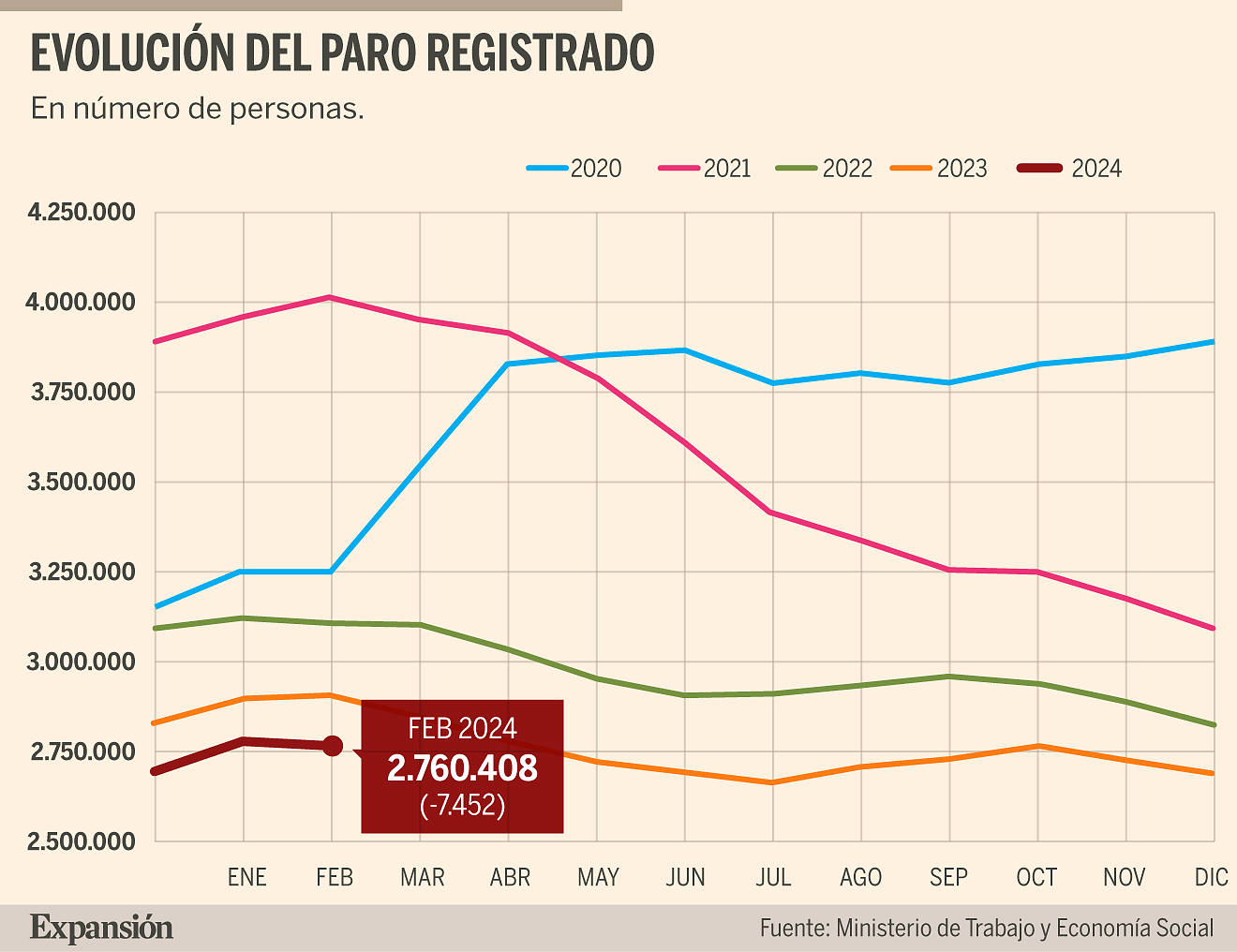The number of unemployed people registered in the offices of the State Public Employment Service (SEPE) decreased in February by 7,452 people (-0.27%), to 2,760,408 unemployed, the lowest figure since 2008 for this month, after that the year started with an increase of 60,404 unemployed people registered in the employment offices after the end of the Christmas campaign.
The drop in unemployment in February is attributed to the boost in the services sector, according to the data on registered unemployment and affiliation for the month of February made public today by the Ministries of Labor and Social Security.
The reduction in unemployment contrasts with the increase in unemployment in February 2023 (2,618 unemployed). In the last 12 months, unemployment has been cut by 150,607 people (-5.17%) and Social Security has gained 538,239 affiliates in average values, with a year-on-year growth of almost 2.7%.
By sectors, unemployment fell in services with 8,548 fewer unemployed in the old inem (-0.43%); construction, with 2,433 fewer unemployed (-1.14%); industry, with -1,865 (-0.86%); and agriculture, which decreased 315 (-0.32%). On the other hand, the group Without Previous Employment -people who sign up for unemployment for the first time- increases by 5,709 (2.33%). Unemployment among young people increases by 6,601 people.
By territory, unemployment fell in 11 autonomous communities, with Andalusia (-4,110), the Valencian Community (-1,552) and Castilla y León (-704) leading the way, while it increased in another six, mainly in Aragón (667), Madrid ( 465) and Navarra (374).
The number of average affiliates stood at 20,708,382 contributors at the end of the month, its highest level in this month within the historical series, due to the progress in hospitality and education - between them almost 60,000 new affiliates incorporated into the system -, followed by education, construction and manufacturing industry until its best February in 17 years after gaining 103,621 average affiliates.
By sectors, the hospitality industry in particular leads the labor employment, with 29,230 more affiliates, along with education, with 28,941 more, followed by construction, with 18,189 more, and the manufacturing industry, with 13,130 more. Health activities and social services and commerce lose members, with 10,252 and 9,590 fewer, respectively. In the self-employed regime, 10,097 members were added, bringing the total to 3.33 million.
The total number of Social Security affiliates thus reaches the "highest" figures in the historical series in the month of February, with more than 20.7 million contributors, increasing in most sectors of activity except agriculture.
The growth has been generalized in all autonomous communities and cities, except Castilla-La Mancha. The greatest advances in membership rates occurred in the Canary Islands, with 4.09%; Madrid, (3.85%) and the Balearic Islands, 3.72%).
In the last year, Social Security has gained 538,239 affiliates in average values, with a year-on-year growth of almost 2.7%.
In seasonally adjusted terms, there is also a record increase for the month of February with 73,492 affiliates (0.3%), up to 20,954,785 workers.
Regarding registered contracts, a total of 1,137,407 were signed, 52,605 more than a year ago, of which 46% (523,445) were indefinite. Of these, 246,879 were full-time (16,244 more); 132,365, part-time (11,105 more); and 144,201, discontinuous permanent employees (2,896 more).
The Government has stated that the affiliation and unemployment data for February demonstrate the inertia of the labor reform. "Registered unemployment in February falls by almost 7,500 people, which contrasts with what used to happen in February, (...) when registered unemployment used to rise by more than 33,000 people. Therefore, it is the best February in terms of registered unemployment for 16 years," said the Secretary of State for Labor, Joaquín Pérez Rey, who appeared to comment on the data together with the Secretary of State for Social Security and Pensions, Borja Suárez.
Both have highlighted the dynamism of the labor market, particularly in terms of affiliation: "In the entire historical series there has not been such intense growth in employment [in February]," Suárez stressed.
Likewise, he has described the start of the year as "spectacular" in terms of average affiliation, since the sum between January and February of this year shows more than 110,000 new affiliates, a figure that allows Social Security to face 2024 with "good prospects between now and summer."
For Pérez Rey, the protection of workers since the Covid-19 pandemic, with the increase in the interprofessional minimum wage (SMI), the protection of the weakest groups, the inclusion of new groups to unemployment - artists or domestic workers - and The labor reform explains why we have current unemployment data.
The Spanish Confederation of Business Organizations (CEOE) has described the data as "very good" and even "historical", although despite the signs of "resilience of the labor market", Spain faces "a context of certain moderation of the economy and of uncertainty".
A moderation of the economy, according to the employers' association, which "makes it necessary" to promote a "climate of legal security, regulatory stability and predictability" that "generates confidence" that "allows for the consolidation" of investment decisions.
The employers' association has highlighted the drive of the private sector as an engine of job creation and, in addition to quality, but also remembers that Spain continues to lead the list of the OECD countries with the most unemployment despite "the difficulty that companies have of certain sectors to find workers.
The majority unions have also evaluated the data positively: CCOO has asked the Government to commit to full employment in this legislature, with less seasonality and temporality and UGT has shown its concern about the "unbearable" long-term unemployment of both a year like two, which continues without decreasing, and has asked the Government and the Autonomous Communities to implement measures to help their relocation.
USO, for its part, has asked for more clarity regarding discontinuous permanent positions and CSIF has focused on the fact that the Public Administration breaks the trend of job creation in most sectors and destroys 71,183 jobs in February, although it is 5.86% less compared to February 2023.

 Israel-Hamas war: Gaza between hope of truce and fear of Israeli offensive in the South
Israel-Hamas war: Gaza between hope of truce and fear of Israeli offensive in the South “Mom, Dad, please don’t die”: in the United States, a nine-year-old child saves the lives of his parents injured in a tornado
“Mom, Dad, please don’t die”: in the United States, a nine-year-old child saves the lives of his parents injured in a tornado War in Ukraine: Putin orders nuclear exercises in response to Macron and “Western leaders”
War in Ukraine: Putin orders nuclear exercises in response to Macron and “Western leaders” Mexico: the last moments of surfers found in a well, killed with a bullet to the head
Mexico: the last moments of surfers found in a well, killed with a bullet to the head A baby whose mother smoked during pregnancy will age more quickly
A baby whose mother smoked during pregnancy will age more quickly The euro zone economy grows in April at its best pace in almost a year but inflationary pressure increases
The euro zone economy grows in April at its best pace in almost a year but inflationary pressure increases Children born thanks to PMA do not have more cancers than others
Children born thanks to PMA do not have more cancers than others Breast cancer: less than one in two French women follow screening recommendations
Breast cancer: less than one in two French women follow screening recommendations “A potential environmental disaster”: Paris town hall opposes an oil drilling project in Seine-et-Marne
“A potential environmental disaster”: Paris town hall opposes an oil drilling project in Seine-et-Marne The governor of the Banque de France pleads for the development of French and European AI
The governor of the Banque de France pleads for the development of French and European AI Clariane (ex-Korian) announces a sale of its home hospitalization activities
Clariane (ex-Korian) announces a sale of its home hospitalization activities To everyone's surprise, the Hades 2 event video game is released in early access
To everyone's surprise, the Hades 2 event video game is released in early access The Origin of the World, exhibited at the Center Pompidou Metz, target of an “artistic performance”
The Origin of the World, exhibited at the Center Pompidou Metz, target of an “artistic performance” Threatened with death for having insulted the mobilized pro-Palestinian students, Élie Semoun files a complaint
Threatened with death for having insulted the mobilized pro-Palestinian students, Élie Semoun files a complaint Vienna, Paris, Milan celebrate the 200th anniversary of Beethoven's 9th Symphony
Vienna, Paris, Milan celebrate the 200th anniversary of Beethoven's 9th Symphony Cannes Film Festival: call for strike one week before opening
Cannes Film Festival: call for strike one week before opening Omoda 7, another Chinese car that could be manufactured in Spain
Omoda 7, another Chinese car that could be manufactured in Spain BYD chooses CA Auto Bank as financial partner in Spain
BYD chooses CA Auto Bank as financial partner in Spain Tesla and Baidu sign key agreement to boost development of autonomous driving
Tesla and Baidu sign key agreement to boost development of autonomous driving Skoda Kodiaq 2024: a 'beast' plug-in hybrid SUV
Skoda Kodiaq 2024: a 'beast' plug-in hybrid SUV The home mortgage firm rises 3.8% in February and the average interest moderates to 3.33%
The home mortgage firm rises 3.8% in February and the average interest moderates to 3.33% This is how housing prices have changed in Spain in the last decade
This is how housing prices have changed in Spain in the last decade The home mortgage firm drops 10% in January and interest soars to 3.46%
The home mortgage firm drops 10% in January and interest soars to 3.46% The jewel of the Rocío de Nagüeles urbanization: a dream villa in Marbella
The jewel of the Rocío de Nagüeles urbanization: a dream villa in Marbella Europeans: David Lisnard expresses his “essential and vital” support for François-Xavier Bellamy
Europeans: David Lisnard expresses his “essential and vital” support for François-Xavier Bellamy Facing Jordan Bardella, the popularity match turns to Gabriel Attal’s advantage
Facing Jordan Bardella, the popularity match turns to Gabriel Attal’s advantage Europeans: a senior official on the National Rally list
Europeans: a senior official on the National Rally list Blockade of Sciences Po: the right denounces a “drift”, the government charges the rebels
Blockade of Sciences Po: the right denounces a “drift”, the government charges the rebels These French cities that will boycott the World Cup in Qatar
These French cities that will boycott the World Cup in Qatar Foot: Italian football protests against a government project which aims to monitor club finances
Foot: Italian football protests against a government project which aims to monitor club finances Champions League: “We are ready for anything,” warns Edin Terzic before PSG-Dortmund
Champions League: “We are ready for anything,” warns Edin Terzic before PSG-Dortmund Premier League: David Moyes to leave West Ham at end of season
Premier League: David Moyes to leave West Ham at end of season Transat CIC: Yoann Richomme winner in the wake of Tabarly, Poupon, Peyron, Desjoyeaux...
Transat CIC: Yoann Richomme winner in the wake of Tabarly, Poupon, Peyron, Desjoyeaux...


















